The Fires of Forgetting: Praise, Practice & Boiling Pu'erh
In which home and other sicknesses provide new paradoxes to drink in and ship out.
February. Boy, are we glad to see you. I may be a January baby. It may be my favorite month. Morning of the year. Crisp. Fresh. New.
But January 2025 was no January for me.
We lost it. I mean that in a lot of ways for a lot of people. I’ll try to keep it tucked.
After helplessly watching my hometown burn—a dire situation where the only thing left to do is praise the unsung heroes of public service, the wildlife firefighters, same as I wrote about some eight years ago—the sickness came. Never have I ever been smacked like that by the flu—just imagine what it did to the twins as they got hit. Today is the first day in weeks I’ve been able to write. To tea. A storm of questions swirls in the grey sky of this Kamakura overhead.
Does a scroll that says everyday is a good day still work its magic if you don’t step into the tea room to see it on a single day? Can a meditative mind still kick in if you lack the wherewithal to be out of bed long enough to meditate? Or, in other words, when the body and mind go, where does that leave the heart? When a town burns and the structures and possessions and face of it vanishes, with what senses do you use to recognize it in the rubble? What do you call a neighbor when both of your houses are gone? When you’re all in hazmat suits?
I feel only compassion for those destroyed neighborhoods where I spent so much time. And for those who inhabit and frequent them, I could only share a link to a post where Imen was offering tea to those who needed it. You may scoff. You may send me the ‘this is fine’ meme. You may tell me a cup of tea when one’s house on fire is like throwing a thimble of water at the sky hoping to snuff out the sun. None of what you can say or feel in all your rage and despair would be wrong. No amount of tea will ever bring back Madlib’s music library.
There are those—both inside and outside—who love to criticize Los Angeles. Perhaps no contemporary city on earth is as mythologized or maligned. Paradise and pariah. Whether powered by jealousy or justification, I’m less interested in hot such takers. Better we turn to those with sincerity and comprehension central to their analysis. Take it from author of City of Quartz & Ecology of Fear, Mike Davis:
“The ultimate world-historical significance - and oddity - of Los Angeles is that it has come to play the double role of utopia and dystopia for advanced capitalism.”
A topia like no other. A place constantly failing and succeeding at becoming itself. What could be more paradoxical? What could be more human? If only we could hear from Mike Davis now. What might he say about these fires?
I’ve not been in Los Angeles for over 19 months, the longest spell away in my life. Naturally, I’ve never missed it so much. How I wanted to hold it as it hurt. To help, however I could. Then, later, how I longed for my mates as our 6-year FCFC podcast anniversary passed. How I craved a real burrito. How I salivated for a chance to play GNX with the windows down in the In-N-Out drive-thru and scream the Kamasi line from the top of my lungs.
Wait, Dweez, I hear you say. I thought you loved where you are at now. Look at all these dispatches where all you seem to do is fawn over Kamakura. Your life in Japan seems great.
You’re not wrong, dear reader. I do love it here. Life in Japan suits me in this era. I remain as obsessed—if not more obsessed—with Kamakura than I did when I moved in two years ago.
So, what gives?
The flu-tipped-fangs of January 2025 reminded me of just how delicate a thing peace of mind can be. How easy it is to revert to a lifetime spent sharpening weapons to fend for myself in the ‘anywhere-but-here, anytime-but-now’ war of mind. That’s what wanderlust does. What hunger does. What a hole in the heart does. That’s what dysfunction does. Whether in a family or a society, or in my case both—it tenses you the fuck up. How can you expect someone to trust, talk and feel when their nerves have been plucked raw? Thrashed. In such a state, survival is all that matters.
It probably didn’t help that today was my first time in the tearoom in two weeks. Full days passed tea-less. Can you imagine? My partner—who endured multi-days managing sick dragons and Dweezes and doggies dolo and deserves all the praise musterable (and, for that matter, mustardable)—knew things were serious when the tea stopped flowing. I’ve had exactly one worse birthday, but even on that occasion at least I could keep food down.
A slog, friends, It’s been a slog.
And so, in many ways, I wasn’t in Kamakura at all. Nor Japan. I might as well have been on the severed floor. And in the same spirit, at the conclusion of sharing these words, I get to engage in my newest practice: forgetting.
Some of this is not by choice. The volume of tiny tasks to remember—2x—over the past 7 months has runneth me over. Queue a wacky video of my staggering amount of mind-slips. Queue the last year of my 30s commencing and that thing called middle age starting to ham handle life’s facts. By choice and nature and writerly material-collecting-impulse, few things have severed me as well in life as my memory. I remember and then re-remember, then write it down. You could say much of my career ghostwriting has been spent memory harvesting, memory polishing, and memory presenting.
But a threshold has been reached. A max cap. A late-spring conversation in Koenji last year with my dearest friend helped me realize that, yes, indeed, some things are better off un-remembered. Not avoided. Denied. Pretended-away. Or otherwise steered-clear of. Just forgotten. Like an owl feather in a breeze long after it left the nest behind.
Many of us get off on filling things up—our homes, our schedules, our cups—but only in the last couple years have I learned the pricelessness of emptiness.
Learning how to be present has been an important corrective phase—but maybe it’s time to start learning how to be absent. The dark side of the moon. The shimmering underbelly of the existence tissue on the way down hunger mountain.
As Kendrick Lamar gets ready to walk onto the stage in New Orleans with the attitude of L.A. yelling next week, let us also say Rest in Peace to another Los Angeles legend we lost in January. David Lynch’s films speak for themselves. You should watch them all. But let’s let this artist, the man who inspired me to start meditating in the first place in his excellent and very low-bar-to-entry book on TM “Catching the Big Fish,” play us out and remind us that when the smoke clears, the light of Los Angeles will shine again like it does nowhere else—and when I do get it see it once more, as it illuminates those faces of the Los Angeles people I love, may I have the emptiness to take in more if it in than ever before.
“I arrived in L.A. at night, so it wasn't until the next morning, when I stepped out of a small apartment on San Vicente Boulevard, that I saw this light. And it thrilled my soul. I feel lucky to live with that light."
I’ve tried a lot of things to fill the hole in my heart. Let’s see how light works.
If it gets really bad, I guess we always have fire.
Respite during the dismal January slog arrived on my doorstep in several packages.
An Arsenal pre-match kit and sweatsuits for the dragons from my three-stripes-employed Aquarian cousin. An uncut voice message of love from a barrel-chested, flame-taming brother. A tender-hearted handwritten note from a Fellow Traveler and damned if she didn’t include these Third Culture honey bug bite oolong tea bags that are among the best sachets I’ve ever soaked (NY Times apparently thoughts so in 2023 & 2024 as well). The GTH Winter issue, complete with ample teas for boiling, a new method I’ve begun to study and watch dark teas transform ever darker—part compost, part creature—brews after two hours over flame.
Then, there was the pleasure of finishing fellow-writer’s-saloner Florentyna Leow’s memoir How Kyoto Breaks Your Heart — in all its persimmon-harvesting glory, but especially for the excellent closing to the essay on tea:
Leow and her crew at Sankaku have also followed up their Ramen-focused 002 issue with 003:Gods. Wrapping ones head around spirituality in Japan is no easy task—and often something you all watch me tangle myself into knots about in these very dispatches—so I’ve appreciated how the insight, reportage, and texture (literally in the case of the 3D rock on the cover) Sankaku has given the topic. Consider picking up a copy of any of their issues—Tokyo, Ramen or Gods—if you are into celebrations of people and craft and rad indie print publications.
Leow’s work was an important inspirational counterweight to the direness of Osamu Dazai’s No Longer Human, which I slurped down mid-flu-bout like a meal through a straw in search of one suicidal moment on Sichirigahama Beach in Kamakura. Found it, like the sickest version of John Fante or Notes From Under-the-Underground. Might have been better served to read more poems from Paul Rossiter, another writers-saloner and founder/publisher of Isobar Press—he only had a handful about Kamakura and I liked each.
Most excitingly though, was the arrival of a package of tea from one of the earliest readers of this here Substack, now two years and 76 posts old. What a gift. What a surprise.
Over these twenty years of regular writing, my work—that wasn’t for other people at least—is rather scatted across the internet. There’s are the crusty college confessions at The Loyolan. The Rio De Janiero blog. The Tumblr. The music writing on HipHopDX. The book reviews at Passion of the Weiss. The Forbes write ups. The Low End Theory retrospectives and Tea Guides at the best Los Angeles culture publication. The Carlos Vela profile in LA Magazine, the homage to the Samba and the abundance of matchday soccer reportage for LAFC. And of course all the print-only pieces—the interviews with Madlib in Vapors, John Carlos in URB, and my Tokyo tea friends in Eighty Degrees—and even a couple missives in the pages of Global Tea Hut.
While it’s true that a decade ago, following a review of the less-than-stellar biography of Gil Scott-Heron, I was lucky enough to connect with the artist’s son and we began a report that continues to this day, the truth is that I never expected to make friends out of my readers.
But as I write these words, I’m listening to the curious, winding trails of a soundscape called “Diogenes.” A what-if-I-just-have-a-looksie-behind-the counter down at the Yee Old Mind Pub of a composition by fellow Substacker, Nick Herman of Kaleidoscopic Mind fame—a guy who I’m now happy to call a friend.
Early last year, after some back and forth, Nick suggested we do a tea exchange. I went first, sending him a bunch of shincha during my annual haul last spring. In return, Nick sent along teas he’s enjoyed recently: a traditional mid-roast Dong Ding, a rougui from Red Blossom in San Francisco’s Chinatown, a lighter high-mountain oolong from Shan Lin Xi, and two 2006 shengs from the pu’erh regions I have the most affinity toward: Da Xue Shan & Lao Ban Zhong. The latter of which, I finally dove into this morning.
I was first introduced to LBZ through 500 year old gushu teas by Imen at Tea Habitat not too long before I moved. Socks were rocked. Stocks were stacked. Jaws were slacked. Bags needed to be repacked. I bought some and have kept it with me here in Kamakura, using it only for extremely special sessions. I maybe have one steep left in the stash. So Nick’s haul couldn’t have come at a better time.
The 2006 LBZ pairs well with Nick’s wavy Subliminal Mind Pub 7” vinyl release—something tangible and real in our era of surreality—that he included alongside some potent cacao bars. Like the music and the bars, the tea drifts and shrugs and climbs and soars. An unpredictable rhythm of percussive serendipity. Something at once foreboding and soothing without shielding you from the harshness. This is a tea your body tastes before your mouth does. More psychoactive than gastro-fantastic. A tube-entering tunnel twister. A tea that stops-mid-journey and taps a morse-code message in staccato on the walls. Then, seems unconcerned about whether it arrived intact or not. A tea that can’t hear our critique of it—because it’s already forgotten that it’s a tea. It’s too busy flowing into all those spaces I thought were cracks and crevices, without realizing its troughs and trophies all the way down. An airy tea of which no amount of steeps will be too many. Or too few. A tea that wonders why waste time trying to describe it and just says, “Here, dummy, have some more, already.” A tea that adheres only to absence.
Of late, I have had such precious few moments for tea alone. How funny that when I finally do, I wish only that I could enjoy it with you.
And in my longwinded ways, maybe I am. We are. Yes, we are drinking together—not in absence or absinthe but in absentia.
As the liquid mandala slides down our throats, Let’s promise to remember not a single drop.
“In Praise of Forgetting” live recitation from the Omachi tea room:
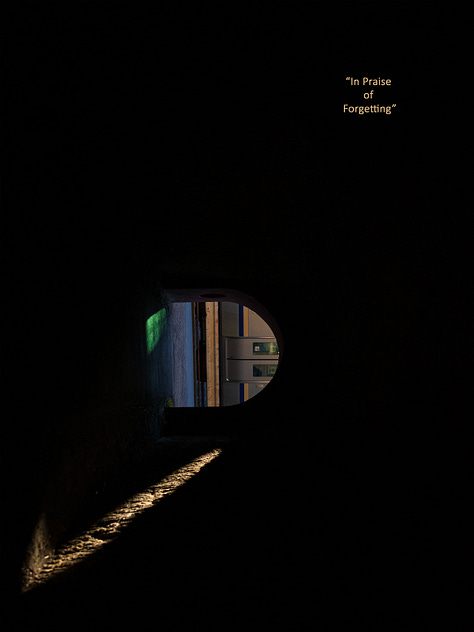
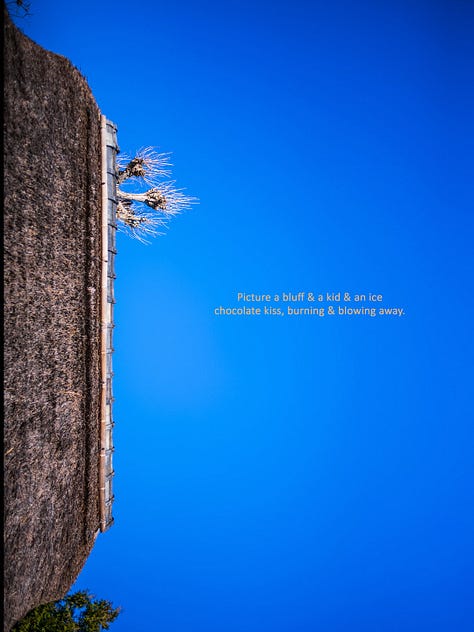
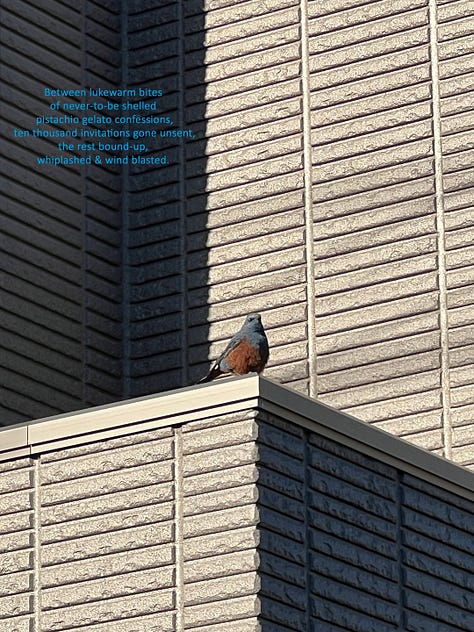
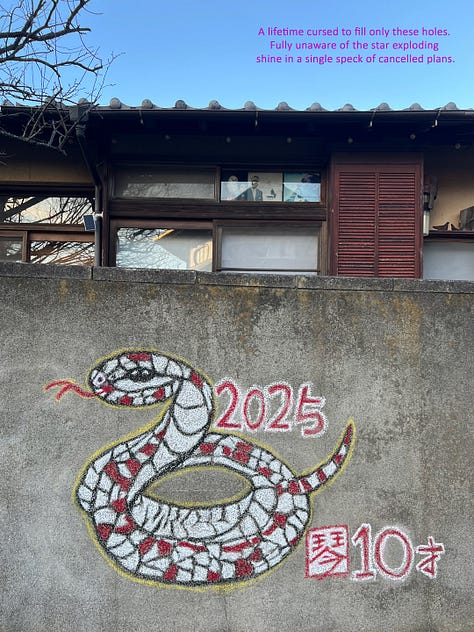
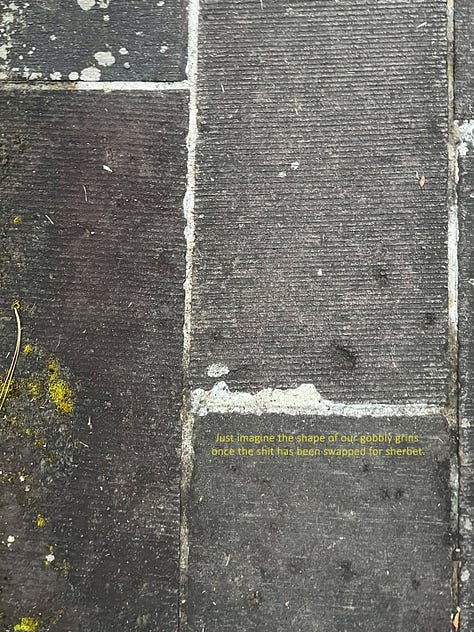
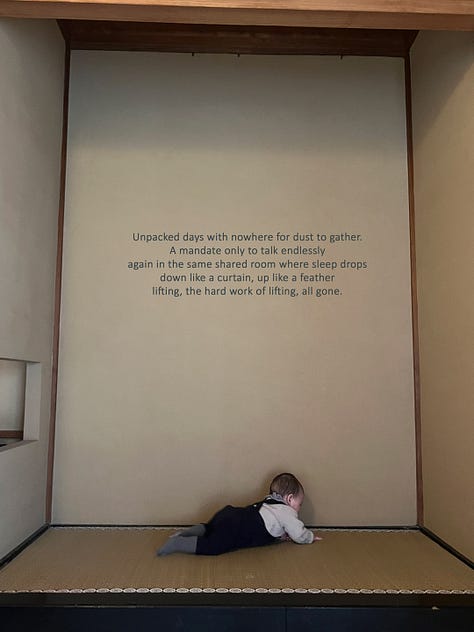
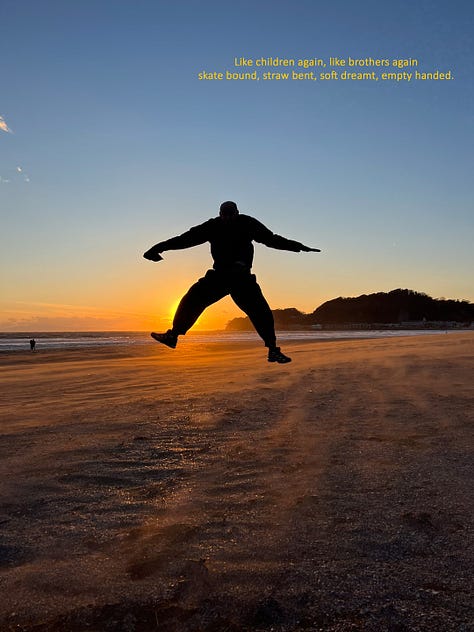
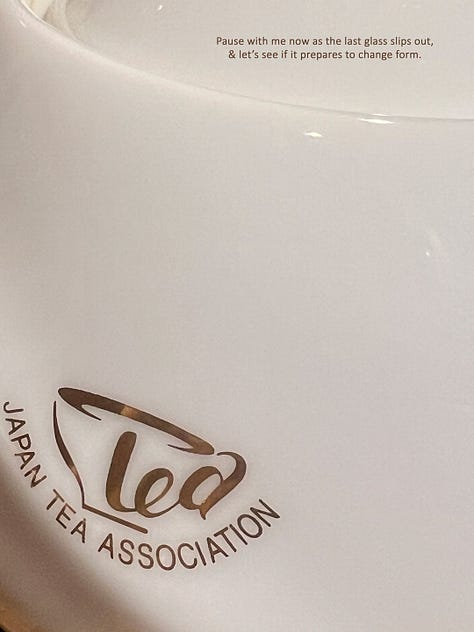
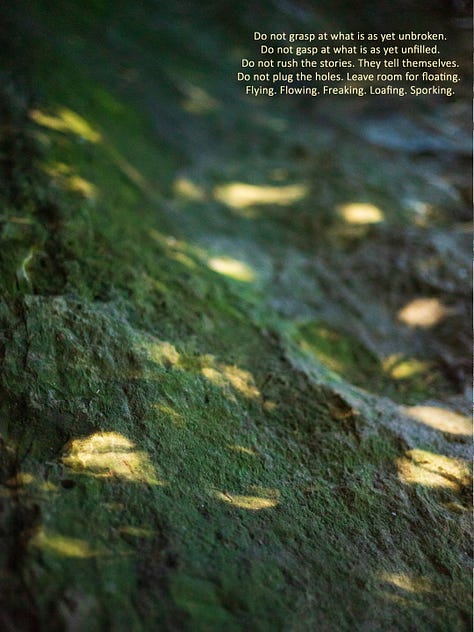
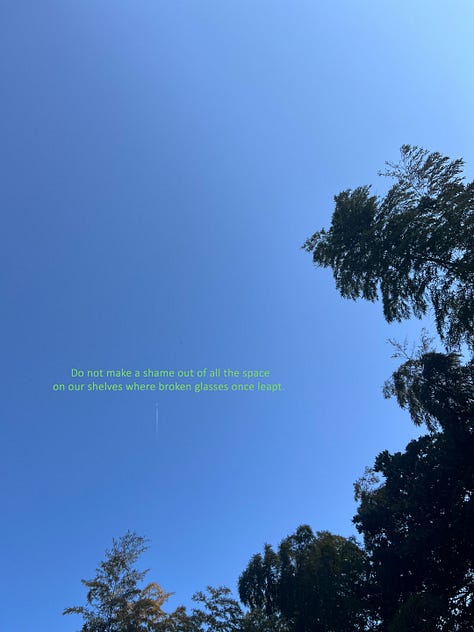
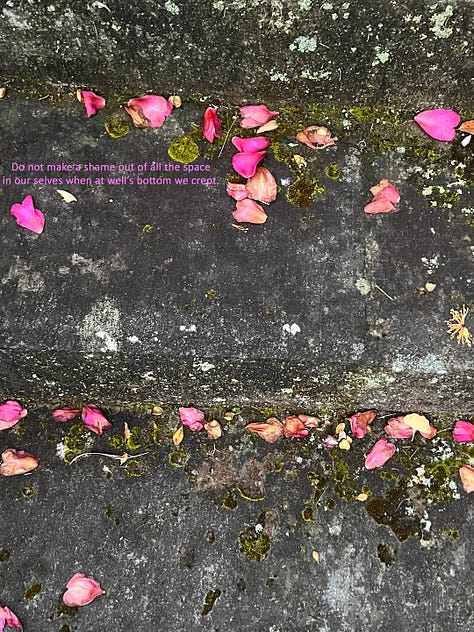
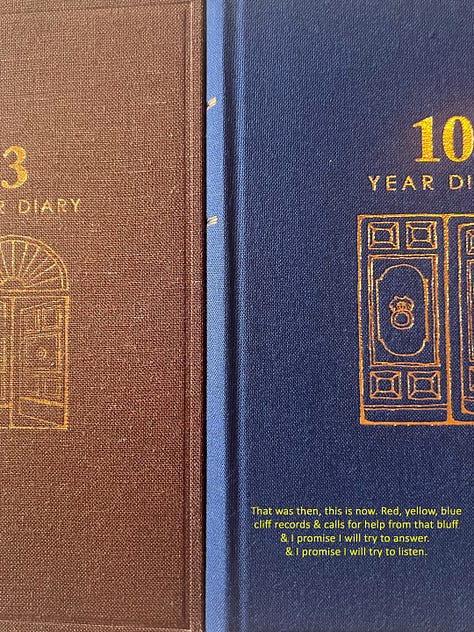
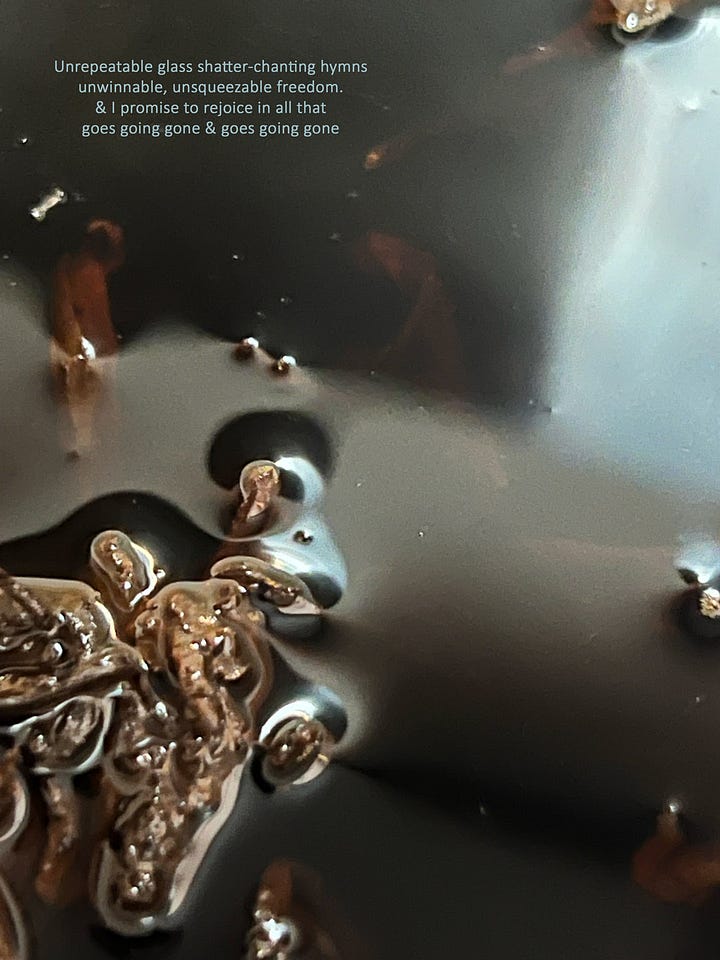
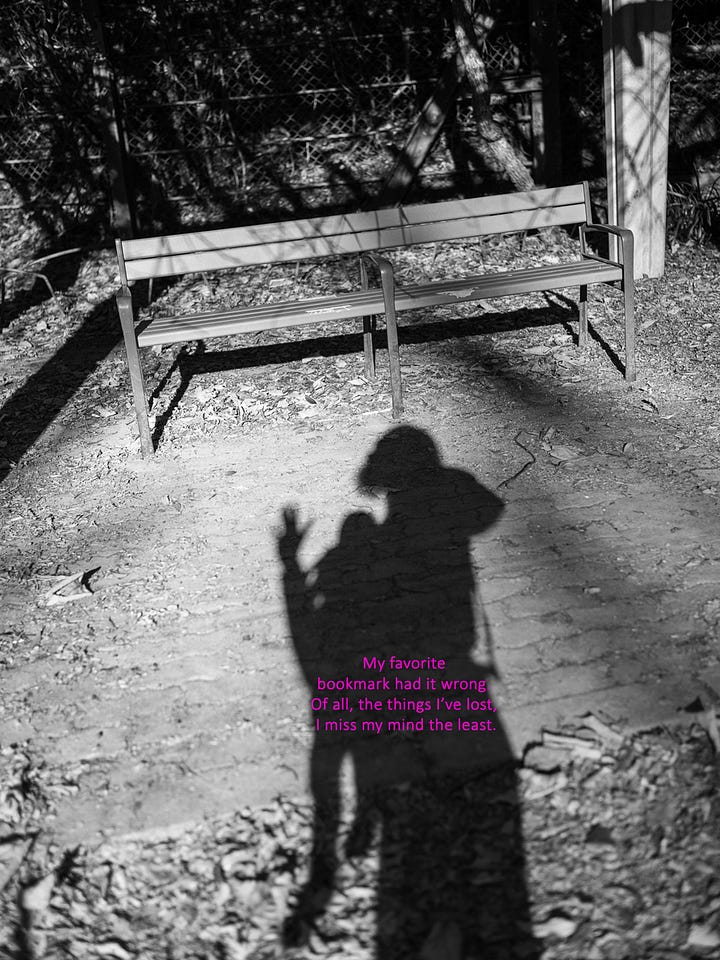
In Praise of Forgetting
Picture a bluff & a kid & an ice
chocolate kiss, burning & blowing away.
Follow the shaved ashes of paradise
folded into love notes gone unpassed.
Between lukewarm bites of never-to-be shelled
pistachio gelato confessions,
ten thousand invitations gone unsent,
the rest bound-up, whiplashed & wind blasted.
A lifetime cursed to fill only these holes.
Fully unaware of the star exploding
shine in a single speck of cancelled plans.
Just imagine the shape of our gobbly grins
once the shit has been swapped for sherbet.
Unpacked days with nowhere for dust to gather.
A mandate only to talk endlessly
again in the same shared room where sleep drops
down like a curtain, up like a feather
lifting, the hard work of lifting, all gone.
Like children again, like brothers again
skate bound, straw bent, soft dreamt, empty handed.
Pause with me now as the last glass slips out,
& let’s see if it prepares to change form.
Do not grasp at what is as yet unbroken.
Do not gasp at what is as yet unfilled.
Do not rush the stories. They tell themselves.
Do not plug the holes. Leave room for floating.
Flying. Flowing. Freaking. Loafing. Sporking.
Do not make a shame out of all the space
on our shelves where broken glasses once leapt.
Do not make a shame out of all the space
in our selves when at well’s bottom we crept.
That was then, this is now. Red, yellow, blue
cliff records & calls for help from that bluff
& I promise I will try to answer.
& I promise I will try to listen.
Unrepeatable glass shatter-chanting hymns
unwinnable, unsqueezable freedom.
& I promise to rejoice in all that
goes going gone & goes going gone
My favorite bookmark had it wrong. Of all,
the things I’ve lost, I miss my mind the least.

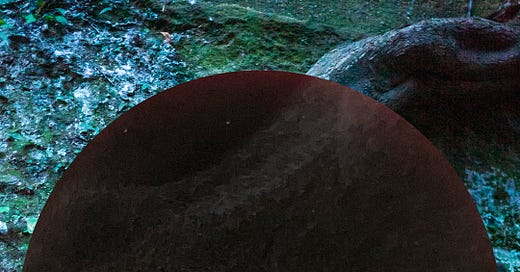



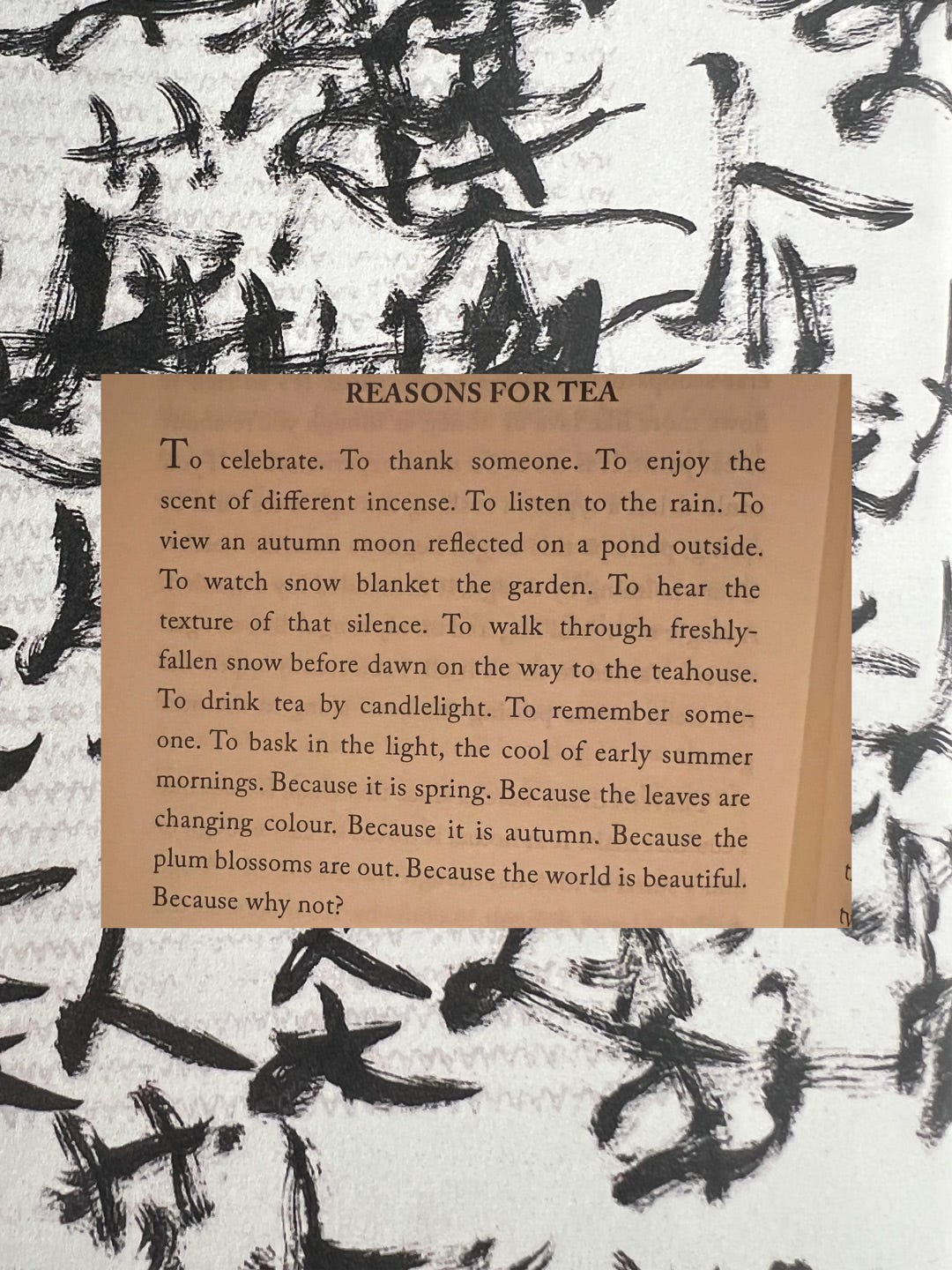
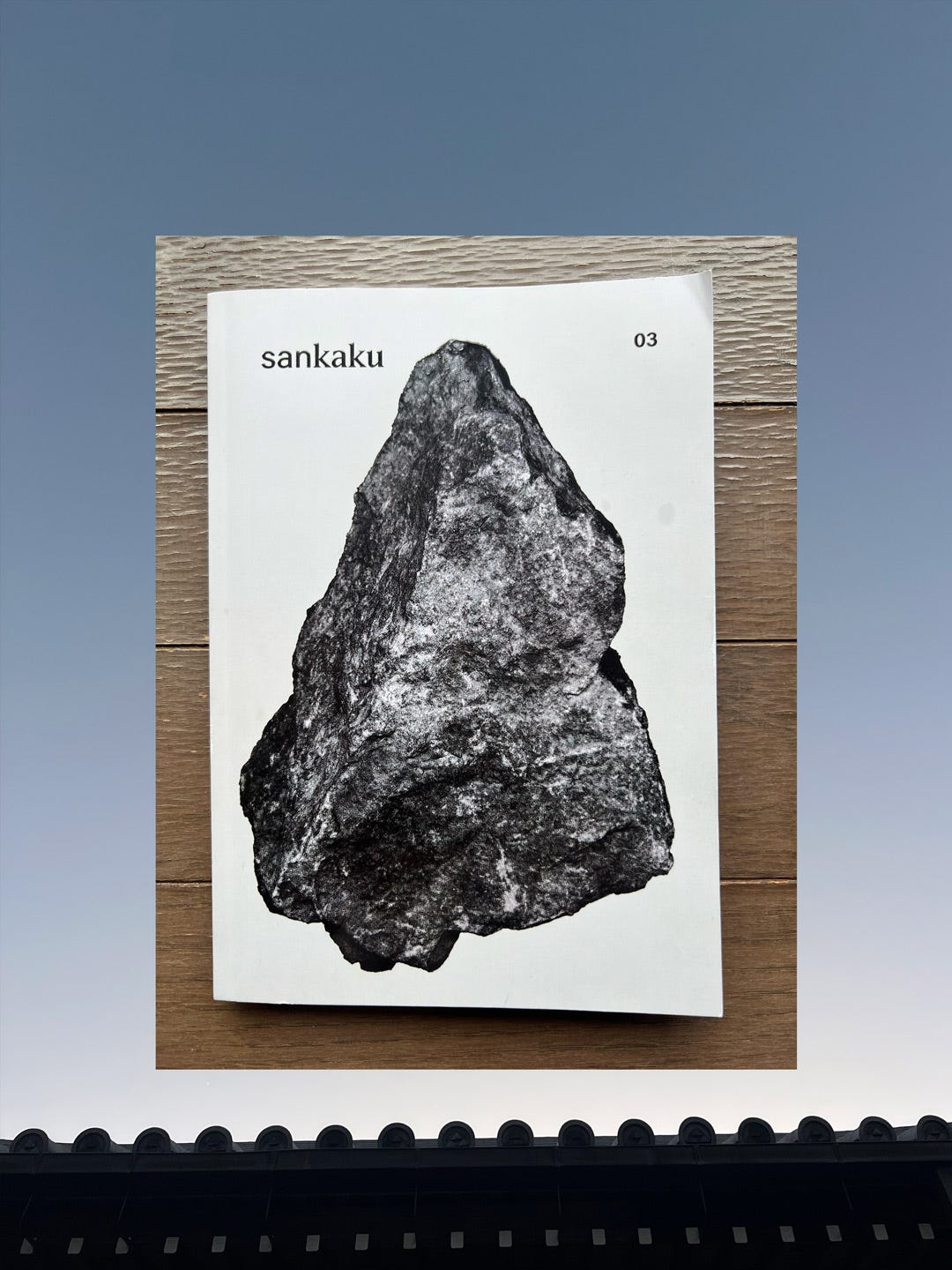
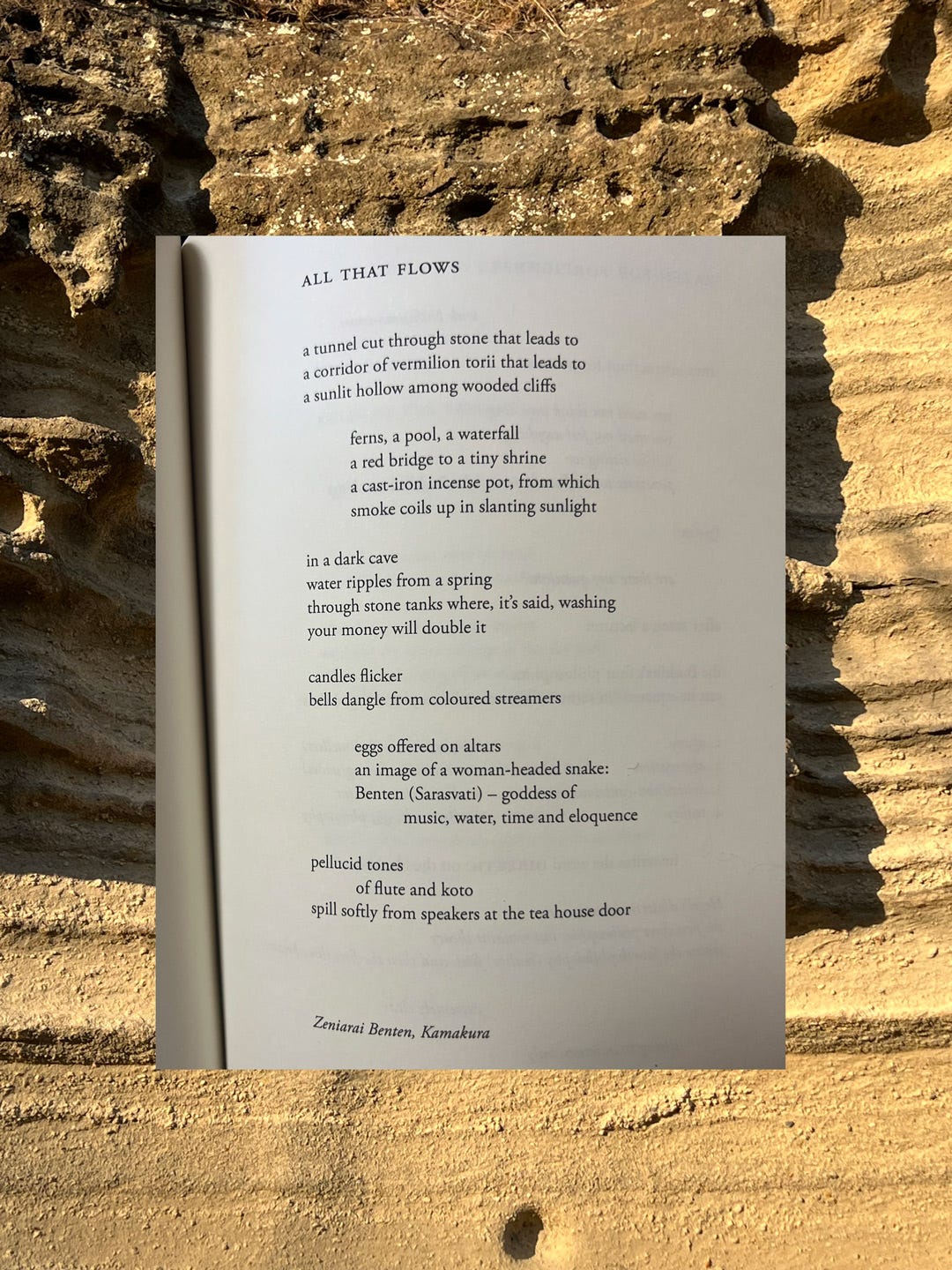
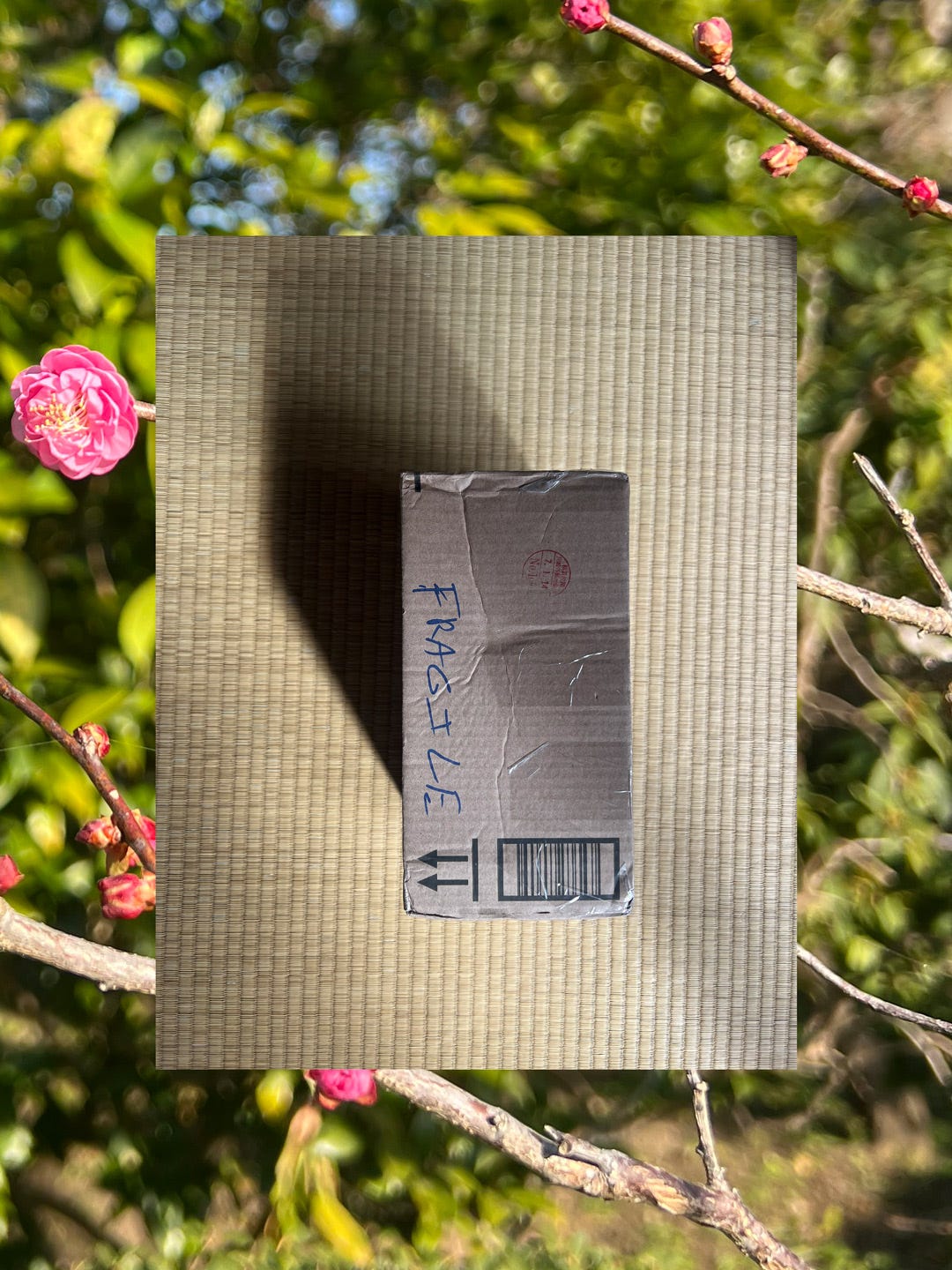
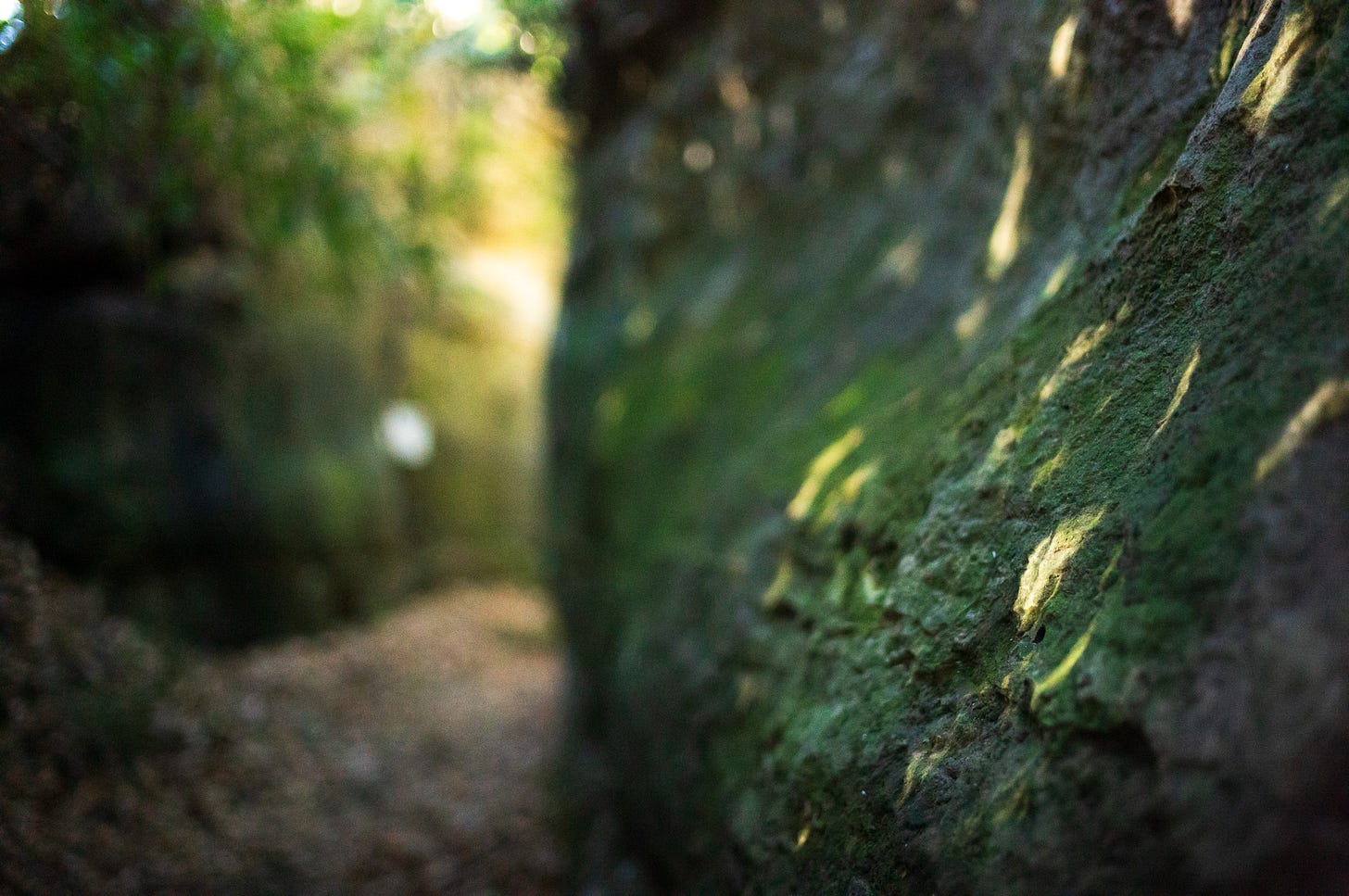
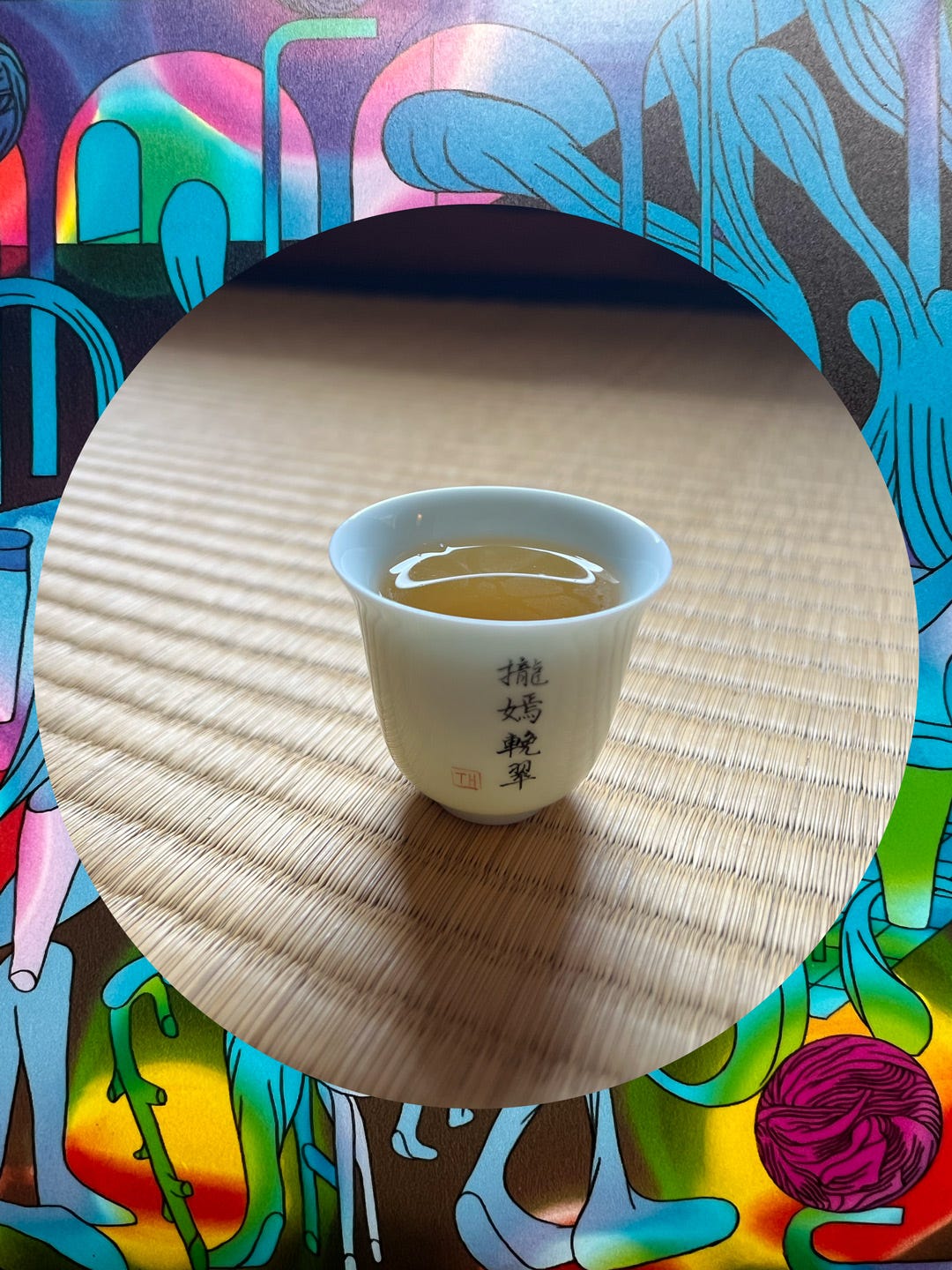
really loved reading this ❤️